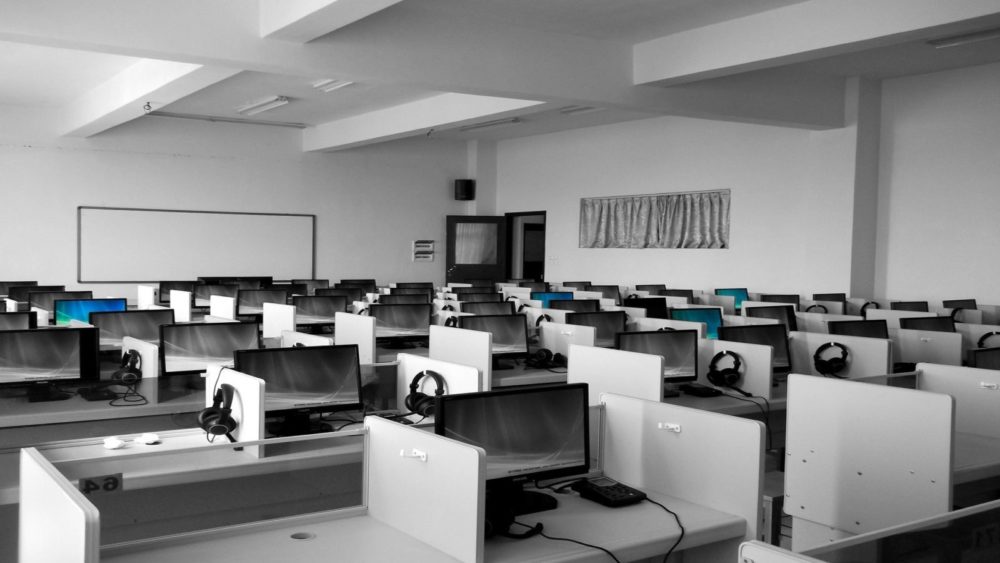Our public schools play a lot of important roles. They educate our children, they offer new opportunities to adults who want to further their education, and school buildings are often used for hosting community events.
And heading into the future, our public schools may also become leaders in another field: e-Waste recycling.
Today, schools are still about the basics: reading, writing and arithmetic, as well as physical education, history, social sciences, and a host of other subjects.
But there’s a new kid on the block that a fast-growing number of schools are also offering: computer science.
And today, the methods for teaching our kids has also changed, and radically. It’s common for schools to teach our kids on computers, not blackboards. Parents have even come to expect that their children, as early as elementary school, will be learning their lessons on their classroom computers. Often times, the little ones know more about how computers work than their parents.
And the connection to recycling? Schools will need to replace their classroom computers, laptops, iPads, and other electronic devices as new technology advances and the older versions become obsolete. This means our schools are likely to have a lot of e-Waste to dispose of.
And if they develop a strong recycling program, educators can do more than just teach our kids, they can also become strong stewards of our environment.
E-waste Computers
Today, public school students at the elementary, middle and high school level are fully wired. Even when school districts do not have the funding to bring computers to all their classrooms, there are now organizations that work to provide individual free desktop computers to local students.
Kramden Institute in Durham, N.C., is a good example. Their mission is to provide computers to classrooms, and then lead technology training session at area schools for students and their families to learn how their new devices work.
Their mission statement is “Providing technology tools and training to bridge the digital divide.” The organization collects, refurbishes and awards computers to students, and Kramden also works to inspire students to succeed by teaching them critical computer, software and internet skills.
The organization also promotes the recycling of used computers and parts to help reduce e-waste.
So with computers becoming a critical part of today’s learning methods, and private businesses and nonprofit organizations working to ensure that students have a school computer, public schools are leading our kids on a technological wave that helps prepare them for the jobs of the future.
At the same time, our schools are likely to be generating a far higher percentage of e-waste than individual homes or even some businesses in the area, as computers become critical components of how the classrooms operate.
And the question now is whether schools who are committed to bringing computers into every classroom also recognize the benefit of recycling their used ones with a company like Great Lakes Electronics Corporation. If they do, that ensures those computers won’t contribute to air, water and soil pollution by ending up in landfills.
Schools Going Green to Help Eliminate E-waste of Computers
Some schools are recognizing this trend. Computers4Kids is a nonprofit organization based in Charlottesville, Virginia, that works to provide computers to kids, but also targets the growing supply of surplus computers that results when businesses, residents, and organizations upgrade their equipment.
They have an educational mission as well. Just as recycling household items like glass, paper, cans and plastics has become commonplace, Computers4Kids is working to make it just as routine to add “electronics” to that list.
The non-profit has an after-school program that’s leading the way when it comes to electronic or e-waste recycling. While they often accept donated computers that can be reused, they recognize that a lot of donated computers simply no longer function and can’t be refurbished. Their goal, then, is to work with schools to ensure those computers are recycled, so the parts within them can be successfully used to make new products.
And there are environmental lessons here as well for our schools, our teachers – and our students. According to the Environmental Protection Agency, more than 4 million tons of e-waste ends up in our nation’s landfills every year. This is a growing environmental threat since a lot of that e-waste contains toxic and dangerous chemicals and substances, including lead and mercury. If those toxins seep out into the soil and water, this poses health risks to the people living nearby, and to our wildlife.
As Computers4Kids has noted, giving students a computer is a great concept, because those kids can then go home and teach their family members the skills they’ve learned. And schools can also teach those kids to become great advocates for our environment by introducing lessons about recycling.
Learning Computer Science

As more and more schools give their students computers to learn with, there’s also a growing trend in schools to teach advanced computer science. Students can now learn coding skills on their classroom computer, and parents appear to like the idea quite a bit. A nationwide Gallup research study showed that 93 percent of parents want their children’s schools to teach computer science today.
In December, a lot of students nationwide used their computers to participate in the Hour of Code, which took place during national Computer Science Education Week, Dec. 4-10.
Hour of Code is a grassroots campaign that has the support of more than 200,000 educators worldwide. Their goal is to introduce students to the creative world of computer science by trying out coding for an hour, and they offer free interactive lessons for both children and adults through websites like code.org, codeacademy.com and scratch.mit.edu.
In the digital age, students are going beyond English and math classes to develop a general knowledge of networks and computer systems. It’s a recognition that today, virtually everything we do – paying bills, shopping, planning a vacation, organizing a business trip – is done digitally.
Many schools are also realizing that new computer science classes can be integrated into general education lessons which gives students early exposure to computer science principles. This can include learning keyboarding, or word processing programs.
On a more sophisticated level, schools are also acknowledging that programming and algorithms can be used to teach problem-solving, a critical skill for students to have, and one applicable to virtually every profession.
Ewaste of Computers Being Eliminated by Schools
What is the student’s role in e-waste disposal? Today, our public schools are leading the nation on a high-tech wave that is teaching our children skills that older generations could never dream of. Public schools, business, community leaders and nonprofit organizations are all working together to ensure that our students are fully wired in the classrooms, and are getting the lessons they need to be well versed in today’s digital world.
Schools are also a leader in generating e-waste. Because of this, schools can become environmental leaders if they teach students about the importance of recycling electronics devices and keeping them out of landfills – and then practicing recycling themselves.
School leaders can arrange to bring their used electronics to a recycling firm like Great Lakes Electronics Corporation, which has a strong commitment to environmental protections.
At Great Lakes Electronics, our specialty is recycling, and we have years of experience performing environmentally friendly recycling of electronic products. We disassemble these items into component parts, and the ones that still have value can be sold for reuse. Other parts are used for metals recovery, and everything is recycled.
Call Great Lakes Electronics today at 888-392-7831 to learn more or to request a quote.

